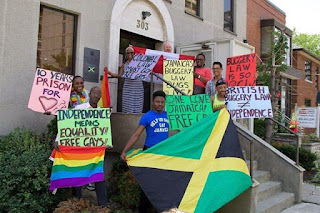 |
| Jamaica hosted the first-ever pride event last August. Many hold signs protesting the anti-buggery law. (via Benha Aquila) |
By: McKenzie Powell
Edited by: Jaelynn Grisso
“I am not a threat to the society,” said Whitney Reid in the Jamaican Forum for Lesbians, All-Sexuals and Gays’ (J-FLAG) ‘We Are Jamaicans’ video campaign. “I don’t want to spend most of my life hiding who I am from the world. I want you to see how beautiful I am, I want you to see how human I am.”
Reid, a transgender woman and Jamaican refugee currently living in the United States, is just one individual out of a larger community of Lesbian, Gay, Bisexual, Transgender, and Queer (LGBTQ) persons who have experienced bigotry within Jamaica’s borders.
Largely due to an extensive history of discrimination toward the LGBTQ community, enforced by a longstanding anti-buggery law, Jamaicans are just recently becoming familiar with Westernized terms of identity such as ‘transgender.’
“There was no such thing as trans* a couple of years ago. The trans* community is being created as we speak,” said Carla Moore, professor of gender and development at the University of the West Indies Mona, Western Jamaica Campus.
Through the work of Jamaican advocacy groups like J-FLAG, TransWave and Colour Pink Group (CPG), more information about this underrepresented group is being shared to raise awareness and increase humanization of transgender Jamaicans.
“Knowledge and understanding of trans* identity is growing and many more are coming out as trans*,” said Dane Lewis, the executive director of J-FLAG and the co-chair of the Caribbean Forum for Liberation and Acceptance of Genders and Sexualities (Cari-FLAGS).
Discrimination against those who are trans*
Although more citizens are said to be self-identifying as transgender, the implications of publicly announcing this identity are still very risky, resulting in possible beatings, discrimination, homelessness and poverty.
Jessica JBurton, executive director and founder of CPG, experienced the cycle herself when she was kicked out of her house and forced to live on the streets of New Kingston at 16 years old due to her sexual identity. She was soon performing sex-work in an effort to make money while suffering from poor hygiene, lack of food and an absence of clothes.
“Every day someone dies. Some person dies by HIV-related illnesses, a person dies because they were doing sex-work for a living and they got killed,” Jburton said. “Access to health care was a major issue for the homeless population in Jamaica. They could lose their life accessing care there.”
After accessing education, JBurton used her experience to create CPG, a support group that represents and assists the Jamaican couch surfing and homeless Gay Men, Other Men Who Have Sex With Men, and Transgender (GMT) community.
The causes leading to discrimination
TransWave, a Jamaican transgender advocacy group that uses social media to increase knowledge of transgender health and wellbeing, uses stories like Jburton’s to strengthen the overall understanding and tolerance of the country’s trans* community.
“Homosexuality is considered a sin as Christianity is embedded in our country. Religion spurs on the fear that a fiery hell awaits LGBTQ Jamaicans,” said Neish McLean, who is a co-founder of TransWave.
While Moore agreed that religion plays a large role in Jamaica’s deep-rooted homophobia, she also stated that the prejudice stems from colonization and slavery.
“There are a couple of movements that have shaped the way Jamaicans relate to gender variants and non-heterosexual sexuality. One of them is the slavery movement, because what you had is a deliberate cultural disruption that taught black people on the plantation that same-sex sex was wrong. They needed to have heterosexual sex because…that’s what would make new slaves,” Moore said.
The rape of black men on the plantation in an effort to emasculate and “break them” was used as a type of punishment that, ultimately, led to black men having a “very unhealthy relationship with same-sex sex,” Moore stated.
The combination of Jamaica’s dark past involving colonialism and slavery, in addition to strong religious beliefs and a robust national identity, has created difficulties in progressive dialogue between Jamaican LGBTQ and heterosexual communities. This communication is even further strained by deep-rooted beliefs that sexuality is a practice and not an identity.
“We have created this single story that Jamaica is myopically homophobic. We forget there are a lot of people living in Jamaica who are loving queerly but who would never take on the identity of a queer Jamaican,” Moore said. “We are completely ignoring the people who have deliberately employed invisibility as a technique of freedom and who don’t feel oppressed by it.”
Moore hopes that Jamaicans will soon find a balance between gender and sexual variants, but on their own terms and without the continued pressure from outside forces like the United States’ LGBTQ politics.
“We have our own way of doing things and we always have,” Moore said. “I hope that the LGBT community can see where they need to remain a part of the Jamaican community and I hope that the Jamaican community can see where it is important for them to retain their LGBT people as members.”




No comments:
Post a Comment